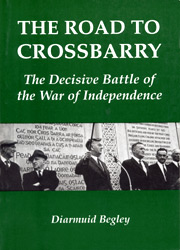
Diarmuid Begley, only son of Flor and Ann Ita nee
Deasy, was born in Bandon 1936 and educated at
After the death of his father in 1979
he continued with and expanded the family business in Bandon. Diarmuid is
involved in many community activities, being a founder member and Chairman of
The West Cork Heritage Centre. He was also closely associated with the
formation of the Bandon Gramophone Circle and other local activities.
Like many other close relatives of
those who took an active part in the War of Independence he has avoided
discussion on aspects of that war. We are now privileged that in order to
dispel some romantic myths and inaccuracies he has decided to put the record
straight.
I first attended school in 1940 at St. Fintan's National
School, Bandon. At
that time, Ireland, through the efforts and sacrifices of
the previous generation of men and women, was free and independent, had its own
government and
its own Department of Education for almost 20 years.
Yet, I can
honestly say, that the Department of Education then, and up to
the mid to late
fifties, when I left secondary education, seemed either
ashamed or unable to sanction any
school history book which dealt with
the
men and women of 1919 to 1921 and their final victory over the forces of the
Crown.
There were of course many teachers whose outlook was
nationalistic and it was because of their pride
in our independence, that my
generation
was first introduced to the Easter rising of 1916 and to the War
of
Independence, but even then there were very meagre chapters, if any,
in the school history books now produced and
published by Irish firms
and sanctioned
by the Department of Education. By 1950 Grants History
of Europe was on our history course at secondary
school and it dealt with
England's
victory over Germany and Japan in the Second World War of
1939 to 1945
but to my knowledge we still did not have a history book
which dealt with our War of Independence of 1919
to 1921.
In the late forties I first read
"Rebel Corks Fighting Story" published by the "Kerryman"
newspaper in 1947.
By 1952 I was no longer a
"boy", I could ask questions about the
"trouble" times of my parents and their contemporaries and
though some of the answers were a little guarded, I learned more and more of
what it meant to live in Ireland,
prior to, and during the War of Independence
and the pride of being Irish and free grew in me. The answers to some
of my questions were a long time coming because the questions would have
been
deemed sensitive, but, those answers came too, with the passage of
time.
I read of the fight for freedom up and
down the country ; of Dan
Breen, Sean Tracey, the Kents, Austin Stack, Liam
Deasy, Tom Barry and
Liam Lynch; of the Brigade Officers, the Battalion
Officers, the Company Captains,
the Lieutenants, the active service men, the scouts, the key men
at the river crossings, the young boys and the
postal arid railway
employees, who
contributed so much and of the women who carried so much of the load, most of
the grief, and without whom there could not have been a War of Independence.
I could not read and learn enough
about the time that was in it. Thank
God most of what I have read was
written prior to the arrival of the
revisionists on the scene, with their
apologetic accounts, so much at
variance with what I had heard from
participants. (They are really the
"spur" that made me agree to
write this appreciation of the gallant men
of the Battle of Crossbarry, the
members of the Third (West) Cork Brigade,
and the wives and sisters who supported
them.)
I want my
children, my grandchildren and their generations to read of
Crossbarry as
it happened. To pass on to them a pride in the men and
women, their
grandparents and great grandparents, who gained for my
generation, this generation and
generations to come, the right to live and
work
in our country, independent and free. I want them to read of what
really happened before the revisionists come up
with their further
apologies for our
history and for those men and women who made it
happen.
To do this, it is very necessary to
fill in the background to the War of
Independence and to introduce the
reader to the way things were in Ireland prior to July 11th 1921 when the mighty British
Empire called for
a truce.
To deal properly with the Battle of
Crossbarry, the final great chapter
of the
War of Independence, it is necessary first, to give the young readers a brief
synopsis of the events which brought this about. In doing so, I will
deal very briefly with the main events of the
period from 1858 to 1916 in
chronological
order and hope that my efforts will stimulate a desire in them for more
detailed knowledge of that period of our history. At the
end of this story I will list some of the sources
where the quest for further
knowledge
will be satisfied